Real Housewives of Recovery: Reality TV and Addiction
By Kera Yonker

It is no secret that alcohol is readily available on set while filming these shows to grease the wheels of conflict, and not everyone who drinks alcohol misuses it.
Woman holding TV remote with confused expression.
What channel is Teen Mom in Rehab?
When I got sober, I started watching reality television like it was my job. The mindless escapism helped me fill the stretch of evening hours that I would have otherwise spent at a bar or at home with bottles of wine. I had my go-tos: Real Housewives, Southern Charm, Teen Mom. I was content to enjoy the alcohol-fueled drama, the table-flipping, and the manufactured cat fights from the sober safety of my couch.
But as drunken fights frequently become the central conflict between cast members—like the cake throwing incident on last season’s Real Housewives of New Jersey—I noticed a new storyline making its way into the shows: recovery. And lately, I’ve been able to find the whole life cycle of addiction and recovery on reality TV.
But are these accurate and helpful portrayals of addiction and recovery?
Dorinda Medley from Real Housewives of New York City slurs her way through dinners and ends the night in ashamed and guilty tears. Luann de Lesseps returned to the show this season fresh from rehab after a drunken arrest, but still keeps wine in her fridge. Kathryn Dennis of Southern Charm is most evolved: back from rehab, she lovingly mothers her young children, keeps her cool when faced with typical reality show-style attacks, and, most inspiringly, speaks honestly about her struggles with anxiety and depression.
The appearance of these storylines in this kind of reality show is a new phenomenon. When Sonja Morgan of the Real Housewives of New York City quietly cut back on drinking, she casually mentioned that she was “trying something new,” in a blink-and-you-missed-it moment during a confessional. The drama factor in her storyline went down to nothing. She was calm, reasonable, collected; it all went mostly uncommented on by her castmates. As a recovering alcoholic, I was disappointed this wasn’t a point of discussion on the show, especially because taking a step back from alcohol was having such a positive effect on Morgan. Here was an opportunity to talk about the very real and negative effects of alcohol use disorder and emphasize the positives Morgan was experiencing as a result of abstaining, even if not entirely.
Jenelle Evans’ drug use in Teen Mom 2 was impossible to ignore because it was documented on camera for the show in 2013. But any recovery or treatment Evans may have had never made its way to the small screen. In recent seasons, her past drug use is never even acknowledged. Susanna, who asked that we only use her first name, is a 32-year-old public health and substance abuse professional in Denver, Colorado. Based on her knowledge of people in recovery from opioid addiction, she thinks it is “highly unlikely” Evans’ use disorder could go untreated. By not acknowledging her possible treatment, MTV paints an unrealistic picture of addiction and recovery. Susanna says that “as the viewer, we have no insight into [whether or not Evans is in recovery] since it is excluded from the story line. We therefore assume she is not addressing her substance use disorder.”
Susanna also finds fault with how the ancillary characters dealing with addiction are represented on the franchise. Adam Lind, the father to former teen mom Chelsea DeBoer’s daughter Aubree, is never filmed. But the negative talk from on-air cast members surrounding his drug disorder, Susanna says, “only further stigmatizes addiction…and does little to raise awareness about substance use disorders.”
Are shows like Celebrity Rehab and Intervention, where addiction and recovery is the focus, doing any better? Not according to Molly Smith, 24, in long-term recovery for alcohol use disorder. Smith used to watch the show Intervention but says that it had little impact on her getting help because she feels it presented a “narrow view of what addiction looks like.” It was so narrow, she said, that “Years later, when I began struggling with substance use, I had a hard time recognizing that I had a problem because I didn’t fit the narrative I witnessed on that show.”
The homogeneous representation of addiction Smith saw is likely due to the selection process of shows like Intervention. People familiar with the casting (who have asked to remain anonymous) speak of a thorough vetting process to ensure that the treatment the show is offering is the right fit for the individual, and that being filmed (and other show-related variables) won’t interfere with their ability to successfully participate in that treatment. The storylines appear to have a lot in common because the people involved all meet the same specific criteria. Other viewers have reported seeking help after recognizing themselves in the people featured in these shows. And, unlike a lot of other reality television vehicles, the behind-the-scenes goal of these shows is successful treatment, not drunk drama.
When Kathryn Dennis of Southern Charm met the much older Thomas Ravenel, there was plenty of drunken drama between the two of them as well as between Dennis and her other castmates. She is now the mother of two and has completed multiple stints in rehab. In the recently-completed fifth season of the show, Dennis is sober and drama-free. In fact, Dennis was doing so well that she felt like she didn’t need her depression-treating medication anymore. But when she stopped taking her meds for a week, she ended up missing in action, to her castmates’ great concern. After resurfacing, she opened up to them about her struggles with depression.
Dianna Jaynes, a licensed marriage and family therapist in Eagle Rock, California, whose patients include people in recovery from drug and alcohol use disorder says that there is “evidence of [Dennis’s] recovery through her behavior.” This is unlike Luann de Lesseps, where real recovery “is not being portrayed at all.”
The arrest and widely-viewed police video last year of a combative and intoxicated de Lesseps forced the conversation about sobriety into her storyline as she returned to the show from rehab. As she told People magazine last month: “This was a warning….I’m grateful to the universe for making me change my life.”
But her recent return to rehab suggests that Jaynes may have been right: perhaps de Lesseps wasn’t fully committed to recovery. Unlike with Kathryn Dennis, “we haven’t had the gift of time with Luann.”
This season of Real Housewives of New York City ended with a very poignant argument between Medley and de Lesseps that perfectly encapsulates the bizarreness of this pseudo-reality world, where a sober de Lesseps suggests to a drunk Medley that she is “turning,” as in, having too much to drink and going to the dark side. Medley explodes and the rift between them continues for the remaining four episodes. Medley continues to dig in her heels to the point of ridiculousness. She has even claimed on the recently aired reunion episode of the show, which de Lesseps could not attend because had re-entered rehab, that she wasn’t drunk on the night of the fight with de Lesseps. The other castmates float in and out, at times willing to call Medley on her problem but in the next breath saying that no one on the show has an issue and they all drink a little too much sometimes.
It is no secret that alcohol is readily available on set while filming these shows to grease the wheels of conflict, and not everyone who drinks alcohol misuses it. But in cases like Medley’s, where there clearly is a problem that she’s unwilling to face, these programs have as much opportunity to direct the narrative towards reducing the stigma as they do to incite drama. As one viewer in Denver, Colorado points out, the cast members on these shows have huge social media followings with “influential platforms that could be used for good to promote recovery.”
Dorri Olds, 56, is a writer who began using at age 11 and whose idols included Jimi Hendrix and Janis Joplin, both stars who died of drug overdoses. She has been in recovery for 30 years, and thinks that recovery in reality television is a good thing. A former viewer of Celebrity Rehab, Olds has wondered, “what if somebody back then that I looked up to…had gone into recovery?” Olds also points out that “when you’re really that low, and you want to get high, I don’t think anybody’s going to stop you.”
I agree with Molly Smith, who thinks “it is crucial to see more people in recovery on television, but their stories need to be shared in a multidimensional way to break stigma.” The more the stories are shown, in all of their various stages and forms of recovery, the more recognizable they will become to those who need it the most.

